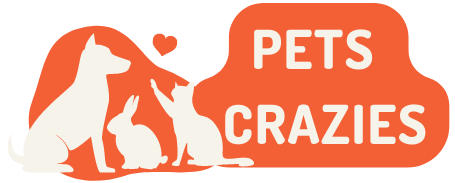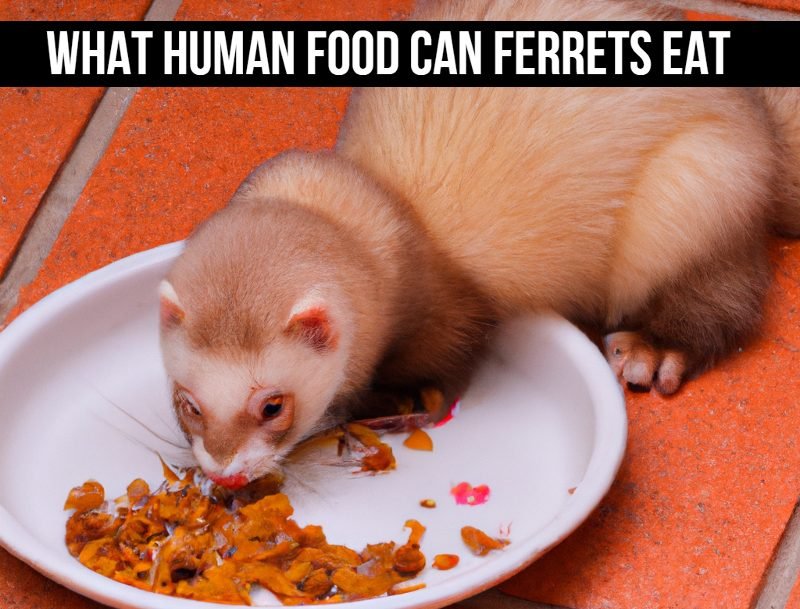Ferrets are carnivores, so their diet in the forest consists mainly of small prey such as rodents, birds, and rabbits. In captivity, pet ferrets can eat a wide variety of human foods, but it’s important only to give them food that is safe for them to eat.
They can consume a wide range of human foods, including eggs, meat, bones, and even organs. They can have trouble digesting high-carbohydrate foods, so you should limit or avoid giving these to your pet.
In this blog post, we’ll discuss some common human foods that ferrets can eat safely. We’ll also provide a list of unsafe foods that should be avoided. So whether you’re just getting a new ferret or you’ve had one for a while and are looking to switch up its diet, be sure to read on!
The Best Human Foods for Ferrets
If you wish to give your ferrets human meals, be sure they offer adequate nutritional value. It’s beneficial to give your ferret special food items rather than just anything.
Animals do not enjoy food the same way that humans do, and they don’t eat for pleasure; rather, it is a requirement. While there may be some foods that your ferret prefers the taste of, in the wild, they would eat what they needed to survive.
Following are some human foods that can be given to ferrets, but should only be done so in moderation as part of a well-rounded diet:
Raw Meat:

The high protein content of meats like beef, chicken, and turkey makes them ideal for ferrets. However, it is high in fat, so while it is ideal for your pet, it should be used in moderation else your ferret will become obese and develop a slew of health issues.
According to many experts, raw ground meat is the best option for your ferret as it most closely resembles their diet among the trees or in nature. In the forest, ferrets would consume raw flesh daily, so this is an excellent substitute for a genuine kill.
Eggs:

Like meat, eggs offer a high protein content that is perfect for your ferret. They also contain omega-3 fatty acids, which are essential for maintaining a healthy coat.
You can feed your ferret raw or cooked eggs, depending on your preference. If you opt for cooked eggs, make sure they are not overcooked, as this can make them difficult to digest.
Bones:
Ferrets will eat a variety of things in the wild, including bones. So offering your ferret a raw bone from time to time is beneficial, but it mustn’t be cooked. Bone fragments can dry out or splinter if you cook them, and those little shards might block your ferrets’ airways. It’s critical to provide your pet with a balanced diet that includes bones.
Fish:
Ferret food mixes on the market don’t contain nearly as many nutrients as fish flesh. Although you might think it’s okay to feed your fish to your ferret, it’s actually not part of their natural diet. Fish in large amounts can cause health problems, so it’s good to give them only a small amount every few days.
Coconut oil and olive:
You can safely give your ferret olive or coconut oil, but only in moderation. Coconut oil is known to help with hairballs and acts as a natural laxative.
It is essential that, after the first time you offer your ferret oil, you keep a watchful eye on it because coconut and olive oil are not components of a natural ferret diet. By doing this, you can observe if the pet has an allergic reaction to it, even though this is uncommon.
Olive oil is also used to treat digestive problems. It should be given in tiny dosages, less than a half spoon per day.
Pumpkin:
If you have been looking for a food that humans eat and that is also part of a regular ferret diet, pumpkin might be the solution. Pumpkin is one of the vegetables that ferrets can consume and, more significantly, like. Pumpkin is a healthy ferret food since it helps to prevent hairballs, owing to its consistency.
Giving your ferret pumpkin once a week in tiny amounts is suggested by the experts. According to certain research, a large amount of pumpkin can lead to adrenal disease in these pets.
What Human Foods Ferrets Shouldn’t Eat
While there are plenty of foods that are appropriate for your ferret, there are also certain human meals that might be harmful to it. At all times, it’s critical to avoid these items.
Milk:
Baby ferrets drink their mother’s milk, but once they become adults, they can’t digest it because they lack a certain enzyme. Additionally, adult ferrets cannot drink milk as they are lactose intolerant. If they were to consume dairy, it would result in health problems such as diarrhoea and dehydration.
Some ferret owners will offer small amounts of milk to their pets as a treat but since there is no real nutritional value in doing this, we’d recommend sticking with water as a drink.
Fruit and Vegetables:
Fruit and vegetables are high in fibre, which is beneficial to both omnivores and herbivores. It has no effect on a carnivorous animal like a ferret. Moreover, these foods could sicken your ferret since he lacks the enzymes to break them down and his metabolic rate is too fast to process them properly.
While there are some fruits and vegetables that ferrets can’t eat, the following are particularly harmful:
- Blackberries
- Bananas
- Kiwi
- Guava
- Brussels sprouts Grapes
- Raising onions
- Potatoes
- Split peas
- Peanuts
If you frequently feed fruit and vegetables to your ferret, this will lead to malnutrition. Not only will he become tired and generally unwell, but more seriously, he could develop cancer.
Bread:
Isn’t it true that everyone enjoys bread? Perhaps not, if you’re a ferret. When your ferret eats bread, he or she will have a difficult time digesting the fibre and grains, which can lead to a variety of health issues if consumed in excess.
You should not only avoid feeding your ferret bread, but also similar items such as cakes and cookies. These products contain many of the same ingredients, which can be harmful to your pet.
Meats that have been processed:

As previously mentioned, ferrets are carnivores, so you may be inclined to feed them breakfast leftovers like bacon. However, it is good to avoid all processed meats.
Meats cured with salt and sugar are bad for ferrets because of their small size as it will dehydrate them. Also, these foods are typically high in fat, which can cause pancreatitis.
What are the risks of feeding your ferrets human food?
There is a possibility that your ferrets could develop nutritional deficiencies if you feed them human food. A diet high in carbohydrates, for example, could lead to vitamin C deficiency. Feeding your pet too much human food could also lead to them becoming overweight or obese. It’s also important to be careful about what you feed ferrets since some human foods (such as chocolate) can be toxic.
In addition, the following are the consequences of feeding human food to ferrets:
1. Diarrhoea
2. Dehydration
3. Pancreatitis
4. Fatty liver disease
5. Kidney disease
6. Cancer
7. Premature death
Conclusion
Ferrets are voracious eaters who enjoy a good meal, but pet owners must give their pets all of the appropriate nutrients. Ferrets can enjoy treats made from human foods such as fish, eggs, and raw meat.
On the flip side, there are also some foods that you should stay away from at all costs since a ferret’s digestive system can’t handle them. In addition, poor nutrition can result in a plethora of health problems for your pet, some deadly.
We hope that this article has helped you understand a little bit more about what human foods ferrets can and cannot eat.
Thank you for reading!
FAQS
What kind of food can ferrets eat?
Organ meat (liver, heart, kidney), as well as chicken, turkey, and rabbit flesh proteins are the ideal Ferret goodies. Occasionally an egg is added for variety.
Is it safe for baby ferrets to eat human food?
As long as the human food is properly cooked and lean, baby ferrets can consume it. Baby ferrets need a diet that is soaring in protein and fat, so make sure to choose foods that will meet those requirements.
What happens if my ferret eats too much sugar?
If your ferret eats excessive sugar, it could lead to obesity and other health problems. A lot of sugar can also cause gastrointestinal upset in ferrets. It is necessary to avoid giving your ferret sugary foods.






